June 17, 2025 | 08:22 GMT +7
June 17, 2025 | 08:22 GMT +7
Hotline: 0913.378.918
June 17, 2025 | 08:22 GMT +7
Hotline: 0913.378.918
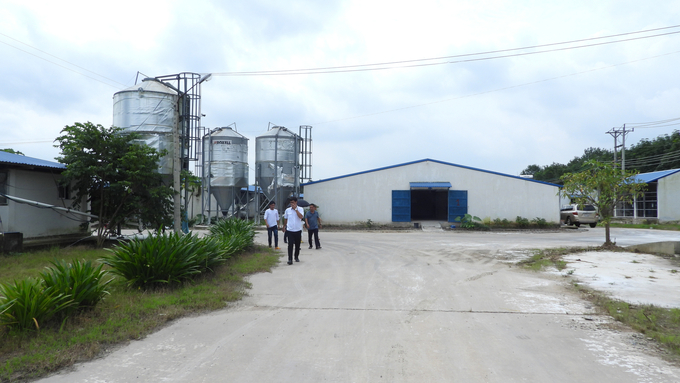
Right from an early age, Binh Duong organizes the construction of disease-free facilities and farming areas, focusing on key communes and regions such as Phu Giao district. Photo: Tran Trung.
Although it is a province focusing on industrial development, in recent years, Binh Duong’s agricultural sector in general and livestock farming in particular have been showing stable growth. The province determines that building a disease-free zone is the key factor in the field of livestock production and animal health as it opens up a stable path of development for the livestock industry.
According to Binh Duong Sub-department of Livestock Production, Animal Health and Fisheries, right from an early age, the province has organized the construction of disease-free farming areas and facilities, concentrated in key communes and regions. This includes enterprises, cooperatives, and farms in accordance with the planning with the aim of providing safe, high-quality food sources for domestic consumers and markets worldwide.
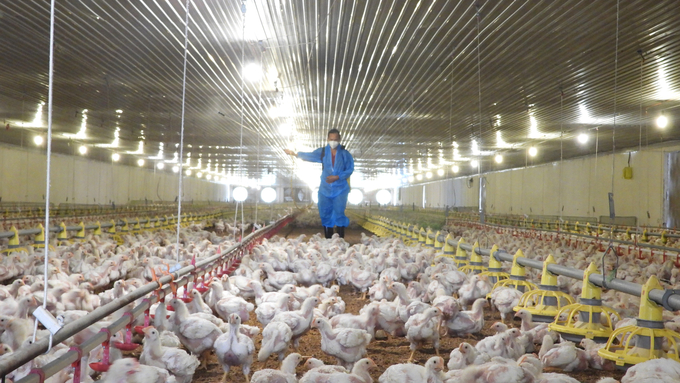
Binh Duong farmers proactively disinfect their farms to ensure disease safety. Photo: Tran Trung.
To meet the conditions for achieving the goal of disease-free livestock production, all industrial farm-scale cattle and poultry raising facilities in Binh Duong are built in accordance with local land use planning permitted by the competent state management agency. They are built separately, far from hospitals, schools, markets, and crowded residential areas. Industrial farms are surrounded by fences or walls, isolated from the outside to limit the influence of people and animals from outside.
Regarding disease safety, most farms apply two important principles in livestock farming: "in and out at the same time" and "having cage-free periods". Accordingly, the same breed of cattle and poultry should be raised in one herd, one barn, at the same time, at the same age.
Having time to free the cages can cut off the disease transmission route because some pathogens have the ability to survive for a long time in the livestock environment. After the barn has been cleaned and disinfected and there are no livestock, the pathogen will have limited conditions to develop.
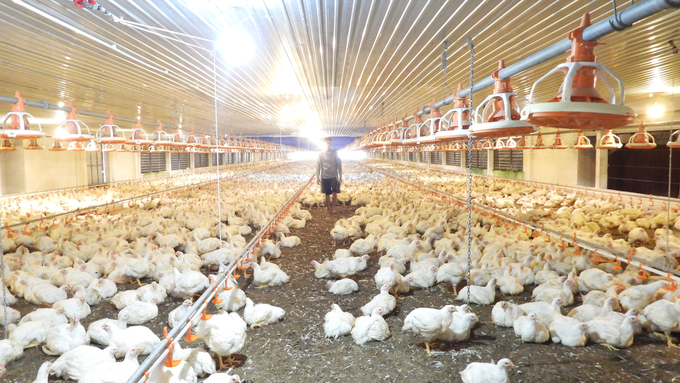
Le Thi Mon's cold chicken farm in Tan Hiep commune is invested as a "resort" free of disease. Photo: Tran Trung.
Le Thi Mon in Tan Hiep commune has a considerably large farm with over 200,000 chickens in Phu Giao district (Binh Duong province). During the farming process, she strictly follows the vaccination process for the entire herd.
Apart from the main vaccinations twice a year, Mon also coordinates with specialized units to perform booster vaccinations and blockade vaccinations when outbreaks appear in the vicinity, or broad-spectrum vaccinations for strange diseases that can affect the chicken flock. Her principle is to vaccinate at the correct age with the correct dosage and type to avoid missing the golden time for the vaccine to take effect.
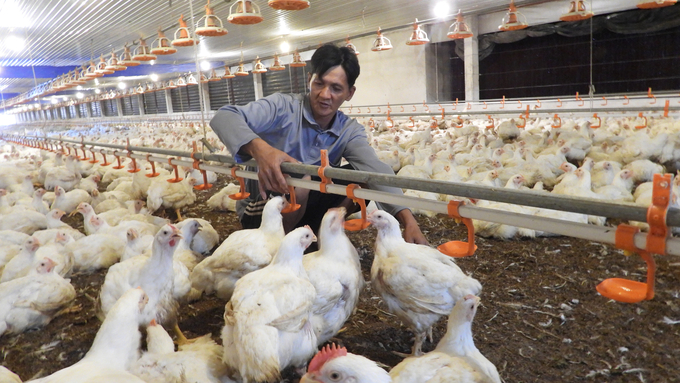
Concentrated livestock farming and applying CNC in production are the "keys" for Binh Duong to build a disease-free zone qualified for international standards. Photo: Tran Trung.
Nguyen Thanh Binh, Deputy Director of Binh Duong Sub-department of Livestock Production, Animal Health and Fisheries, said that the criteria for disease-free zones can be understood as a "visa" for the livestock industry to export products.
In the case of Binh Duong, disease-free zones are not newly built but have existed for many years. This province has implemented many policies, bringing positive results. Accordingly, the state management work in Binh Duong in the field of livestock production and animal health has been oriented towards developing farms, applying high technology and industrialization associated with processing industries and environmental protection.
Binh Duong People's Committee has issued Decision No. 2692 on approving the plan to implement the livestock development strategy for the 2021 - 2030 period, a vision to 2045. This is an important premise to improve the quantity and quality of animal products, ensuring the ability to supply for consumption inside and outside the province while creating more opportunities for exports.
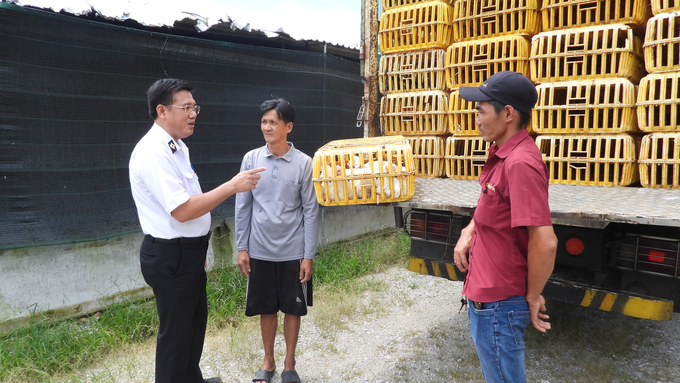
Binh Duong strives to have at least one disease-free area according to the standards of the World Organization for Animal Health (WOAH/OIE) by 2030. Photo: Tran Trung.
To date, the Department of Animal Health has recognized a total of 13 animal disease-free zones in localities planned for concentrated livestock production in Binh Duong: Bau Bang, Dau Tieng, Phu Giao and Bac Tan Uyen. These include 5 animal disease-safe poultry zones, 4 disease-safe cattle zones, and 4 disease-safe zones for raised dogs.
Translated by Samuel Pham
![Turning wind and rain into action: [4] Bringing climate bulletins to remote and isolated areas](https://t.ex-cdn.com/nongnghiepmoitruong.vn/608w/files/linhnhp/2025/06/14/1152-z6704423696987_15fd32ffc26d590d204d520c9dac6786-nongnghiep-151141.jpg)
(VAN) The Vietnam Agriculture and Nature Newspaper interviewed Mr. Vu Thai Truong, Acting Head of Climate Change and Environment at UNDP Vietnam, to gain deeper insight into how climate bulletins are delivered to farmers.

(VAN) In Tien Giang, a high-tech shrimp farm has developed a distinctive energy-saving farming model that has yielded promising results.
![Turning wind and rain into action: [3] 300.000 farmers benefit from agro-climatic bulletins](https://t.ex-cdn.com/nongnghiepmoitruong.vn/608w/files/news/2025/06/12/e5a48259d6a262fc3bb3-nongnghiep-125122.jpg)
(VAN) The agro-climatic bulletin has become a valuable tool for farmers in the Mekong Delta. After more than five years of implementation, the initiative is gradually being expanded nationwide.
![Turning wind and rain into action: [2] Providing forecasts to the people](https://t.ex-cdn.com/nongnghiepmoitruong.vn/608w/files/news/2025/06/12/e5a48259d6a262fc3bb3-nongnghiep-103927.jpg)
(VAN) In addition to improving the quality of hydrometeorological forecasts, putting forecast bulletins into practical use is crucial for production and disaster prevention.

(VAN) Blue carbon is receiving attention for its rapid absorption capacity and vast potential. It represents a promising nature-based solution to respond to climate change.
/2025/06/11/3507-1-161904_583.jpg)
(VAN) Seagrass beds and coral reefs serve as 'cradles' that nurture life in the ocean depths, creating rich aquatic resources in Vietnamese waters.
![Turning wind and rain into action: [1] Forecasting for farmers](https://t.ex-cdn.com/nongnghiepmoitruong.vn/608w/files/news/2025/06/11/e5a48259d6a262fc3bb3-nongnghiep-111919.jpg)
(VAN) Weather is no longer just a matter of fate. Forecasts have now become an essential companion for farmers in every crop season.